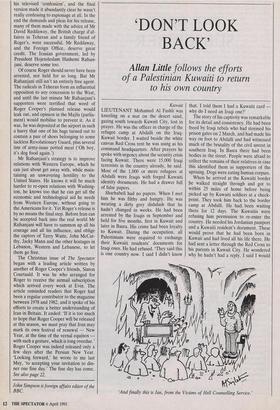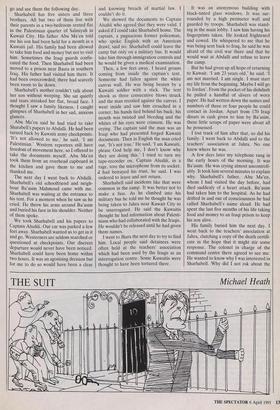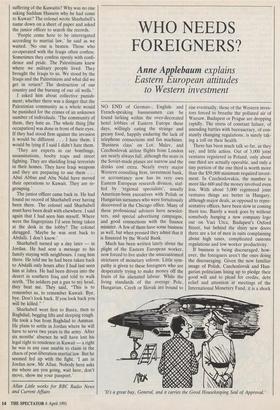`DON'T LOOK BACK'
Allan Little follows the efforts of a Palestinian Kuwaiti to return to his own country
LIEUTENANT Mohamed Al Fashli was kneeling on a mat on the desert sand, gazing south towards Kuwait City, lost in prayer. He was the officer in charge of the refugee camp, at Abdalli on the Iraq- Kuwait border. I waited beside the white canvas Red Cross tent he was using as his command headquarters. After prayers he spoke with urgency about the security crisis facing Kuwait. There were 15,000 Iraqi terrorists in the country already, he said. Most of the 1,000 or more refugees at Abdalli were Iraqis with forged Kuwaiti identity documents. He had a drawer full of false papers.
Sharhabell had no papers. When I met him he was filthy and hungry. He was wearing a dirty grey dishdash that he hadn't changed in weeks. He had been arrested by the Iraqis in September and held for five months, first in Kuwait and later in Basra. His crime had been loyalty to Kuwait. During the occupation, all Palestinians were required to exchange their Kuwaiti residents' documents for Iraqi ones. He had refused. 'They said this is one country now. I said I didn't know Kuwait that. I told them I had a Kuwaiti card — why do I need an Iraqi one?'
The story of his captivity was remarkable for its detail and consistency. He had been freed by Iraqi rebels who had stormed his prison gates on 2 March, and had made his way on foot to Abdalli and had witnessed much of the brutality of the civil unrest in southern Iraq. In Basra there had been bodies in the street. People were afraid to collect the remains of their relatives in case this identified them as supporters of the uprising. Dogs were eating human corpses.
When he arrived at the Kuwaiti border he walked straight through and got to. within 25 miles of home before being picked up by Kuwaiti soldiers at a check- point. They took him back to the border camp at Abdalli. He had, been waiting there for 12 days. The Kuwaitis were refusing him permission to re-enter the country. He needed his Jordanian passport and a Kuwaiti resident's document. These would prove that he had been born in Kuwait and had lived all his life there. He had sent a letter through the Red Cross to his parents in Kuwait City. He wondered why he hadn't had a reply. I said I would And finally this is Jan, from the Victims of Hell Counselling Service.' go and see them the following day.
Sharhabell has five sisters and three brothers. All but two of them live with their parents in a two-bedroom rented flat in the Palestinian quarter of Salmiyah in Kuwait City. His father Abu Ma'en told me his son had been held for a month in a Kuwaiti jail. His family had been allowed to take him food and money but not to visit him. Sometimes the Iraqi guards confis- cated the food. Then Sharhabell had been moved to a prison near Basra in southern Iraq. His father had visited him there. It had been overcrowded; there had scarcely been room to lie down.
Sharhabell's mother couldn't talk about her son without weeping. She sat quietly and tears streaked her flat, broad face. I thought I saw a family likeness. I caught glimpses of Sharhabell in her sad, anxious glances.
Abu Ma'en said he had tried to take Sharabell's papers to Abdalli. He had been turned back by Kuwaiti army checkpoints. `It's not allowed to me,' he said, 'I am Palestinian.' Western reporters still have freedom of movement here, so I offered to take the documents myself. Abu Ma'en took them from an overhead cupboard in the kitchen and gave them to me and thanked me.
The next day I went back to Abdalli. Sharhabell's old schoolfriend and neigh- bour Ba'asim Mahmoud came with me. Sharhabell was waiting at the entrance to his tent. For a moment when he saw us he cried. He threw his arms around Ba'asim and buried his face in his shoulder. Neither of them spoke.
We took Sharhabell and his papers to Captain Alsahli. Our car was parked a few feet away. Sharhabell wanted us to get in it and go. Westerners are seldom searched or questioned at checkpoints. Our discreet departure would never have been noticed. Sharhabell could have been home within two hours. It was an agonising decision but for me to do so would have been a clear and knowing breach of martial law. I couldn't do it.
We showed the documents to Captain Alsahli who agreed,that they were valid. I asked if I could take Sharhabell home. The captain, a pugnacious former policeman, who spoke English with an American drawl, said no. Sharhabell could leave the camp but only on a military bus. It would take him through immigration controls and he would be given a medical examination.
Then, a few feet •away, I heard groans coming from inside the captain's tent. Someone had fallen against the white canvas wall. He was being beaten by a Kuwaiti soldier with a stick. The tent shook as three consecutive blows struck and the man recoiled against the canvas. I went inside and saw him crouched in a corner, his hands tied behind his back; his mouth was twisted and bleeding and the whites of his eyes were crimson. He was crying. The captain said the man was an Iraqi who had presented forged Kuwaiti documents. Then in English the man cried out, 'It's not true.' He said, 'I am Kuwaiti, please God help me, I don't know why they are doing this.' I tried to turn my tape-recorder on. Captain Alsahli, in a rage, tore the microphone from its socket. had betrayed his trust, he said. I was ordered to leave and not return.
Sharhabell said incidents like that were common in the camp. It was better not to make a fuss. As he climbed into his military bus he told me he thought he was being taken to Jahra near Kuwait City to be interrogated. He said the Kuwaitis thought he had information about Palesti- nians who had collaborated with the Iraqis. He wouldn't be released until he had given them names.
I went to Jhara the next day to try to find him. Local people said detainees were often held at the teachers' association which had been used by the Iraqis as an interrogation centre. Some Kuwaitis were thought to have been tortured there. It was an anonymous building with black-tinted glass windows. It was sur- rounded by a high perimeter wall and guarded by troops. Sharhabell was stand- ing in the main lobby. I saw him having his fingerprints taken. He looked frightened and cowed. He whispered to me that he was being sent back to Iraq, he said he was afraid of the civil war there and that he would wait at Abdalli and refuse to leave the camp.
But he had given up all hope of returning to Kuwait. 'I am 23 years old,' he said. 'I am not married. I am single. I must start my life from the beginning. Maybe I will go to Jordan'. From the pocket of his dishdash he pulled a handful of slivers of worn paper. He had written down the names and numbers of three or four people he could contact in Jordan. Apart from 170 Iraqi dinars in cash given to him by Ba'asim, these little scraps of paper were about all he possessed.
I lost track of him after that, so did his family. I went back to Abdalli and to the teachers' association at Jahra. No one knew where he was.
A few days later my telephone rang in the early hours of the morning. It was Ba'asim. He was crying almost uncontroll- ably. It took him several minutes to explain why. Sharhabell's father, Abu Ma'en, whom I had visited the day before, had died suddenly of a heart attack. Ba'asim had taken him to the hospital. As he had drifted in and out of consciousness he had called Sharhabell's name aloud. He had spent the last five months of his life taking food and money to an Iraqi prison to keep his son alive.
His family buried him the next day. I went back to the teachers' association at Jahra, clutching a copy of the death certifi- cate in the hope that it might stir some response. The colonel in charge of the command centre there agreed to see me. He wanted to know why I was interested in Sharhabell. Why did I not ask about the suffering of the Kuwaitis? Why was no one asking Saddam Hussein why he had come to Kuwait? The colonel wrote Sharhabell's name down on a sheet of paper and asked the junior officer to search the records.
People come here to be interrogated according to martial law,' he said as we waited. No one is beaten. Those who co-operated with the Iraqis often confess. Sometimes they confess openly with confi- dence and pride. The Palestinians knew where we military people lived. They brought the Iraqis to us. We stood by the Iraqis and the Palestinians and what did we get in return? The destruction of our country and the burning of our oil wells.'
I asked him about collective punish- ment; whether there was a danger that the Palestinian community as a whole would be punished for the crimes of an unknown number of individuals. 'The community of them, they hate us. The whole thing [the occupation] was done in front of their eyes. If they had stood firm against the invasion it would be different . . . I hate them. I would be lying if I said I didn't hate them.
'They are experts in car bombings, assassinations, booby traps and street fighting. They are shielding Iraqi terrorists in their homes. They have Iraqi weapons and they are preparing to use them . . . Abul Abbas and Abu Nidal have moved their operations to Kuwait. They are re- grouping.' .
The junior officer came back in. He had found no record of Sharhabell ever having been there. The colonel said Sharhabell must have been dealt with elsewhere. I said again that I had seen him myself. Where were the fingerprints I'd seen being taken at the desk in the lobby? The colonel shrugged. 'Maybe he was sent back to Abdalli. I don't know.'
Sharhabell turned up a day later — in Jordan. He had sent a message to his family staying with neighbours. I rang him there. He told me he had been taken back to Abdalli only hours after I had last seen him at Jahra. He had been driven into the desert in southern Iraq and told to walk north. 'The soldiers put a gun to my head, they beat me. They said, "This is to remember us, to remember Kuwait. Bye, bye. Don't look back. If you look back you will be killed." ' Sharhabell went first to Basra, then to Baghdad, begging lifts and sleeping rough. He took a bus from Baghdad to Amman. He plans to settle in Jordan where he will have to serve two years in the army. After six months' absence he will have lost his legal right to residence in Kuwait — a right he was in any case unable to claim in the chaos of post-liberation martial law. But he seemed fed up with the fight. 'I am in Jordan now, Mr Allan. Nobody here asks me where are you going, wait here, don't move, show me your passport.'
Allan Little works for BBC Radio News and Current Affairs




















































 Previous page
Previous page